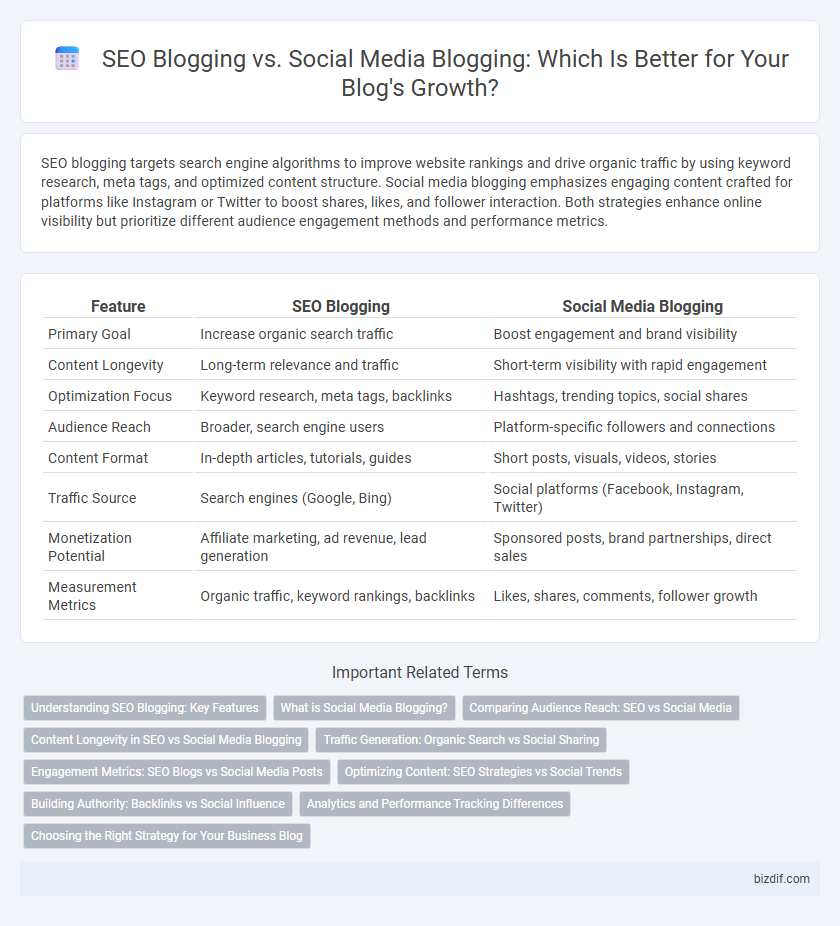SEO blogging targets search engine algorithms to improve website rankings and drive organic traffic by using keyword research, meta tags, and optimized content structure. Social media blogging emphasizes engaging content crafted for platforms like Instagram or Twitter to boost shares, likes, and follower interaction. Both strategies enhance online visibility but prioritize different audience engagement methods and performance metrics.
Table of Comparison
| Feature | SEO Blogging | Social Media Blogging |
|---|---|---|
| Primary Goal | Increase organic search traffic | Boost engagement and brand visibility |
| Content Longevity | Long-term relevance and traffic | Short-term visibility with rapid engagement |
| Optimization Focus | Keyword research, meta tags, backlinks | Hashtags, trending topics, social shares |
| Audience Reach | Broader, search engine users | Platform-specific followers and connections |
| Content Format | In-depth articles, tutorials, guides | Short posts, visuals, videos, stories |
| Traffic Source | Search engines (Google, Bing) | Social platforms (Facebook, Instagram, Twitter) |
| Monetization Potential | Affiliate marketing, ad revenue, lead generation | Sponsored posts, brand partnerships, direct sales |
| Measurement Metrics | Organic traffic, keyword rankings, backlinks | Likes, shares, comments, follower growth |
Understanding SEO Blogging: Key Features
SEO blogging prioritizes keyword research and on-page optimization to improve search engine rankings and drive organic traffic to websites. It involves creating content with targeted keywords, meta descriptions, and internal linking strategies that enhance visibility on Google and other search engines. Consistent publishing of well-optimized articles helps build domain authority and long-term audience growth compared to the faster but often short-lived reach of social media blogging.
What is Social Media Blogging?
Social media blogging involves creating and sharing content directly on social media platforms like Facebook, Instagram, Twitter, and LinkedIn to engage audiences and build brand awareness. Unlike SEO blogging, which targets search engine rankings through keyword optimization and long-form content, social media blogging emphasizes real-time interaction, visual appeal, and shareability. This approach leverages platform-specific algorithms to increase visibility and drive traffic through likes, shares, comments, and hashtags.
Comparing Audience Reach: SEO vs Social Media
SEO blogging targets long-term organic traffic by optimizing content for search engines, which attracts a consistent and highly relevant audience actively seeking specific information. Social media blogging enables rapid audience engagement and wider reach through shares and interactions, often capturing diverse demographics with viral potential. While SEO builds sustained visibility and authority over time, social media delivers immediate exposure and dynamic audience interaction.
Content Longevity in SEO vs Social Media Blogging
SEO blogging focuses on creating evergreen content that maintains visibility and drives organic traffic over long periods through search engine rankings. Social media blogging typically yields rapid engagement but has shorter content lifespan due to fast-feed algorithms and shifting audience attention. Prioritizing SEO blogging enhances content longevity, making the investment more sustainable for ongoing digital marketing efforts.
Traffic Generation: Organic Search vs Social Sharing
SEO blogging drives significant organic search traffic by optimizing content with targeted keywords and meta descriptions, improving visibility on search engines like Google. Social media blogging generates immediate traffic through shares, likes, and comments on platforms such as Facebook, Instagram, and Twitter, often resulting in higher engagement rates. Combining SEO strategies with social sharing amplifies overall traffic by capturing both long-term organic visitors and short-term social media audiences.
Engagement Metrics: SEO Blogs vs Social Media Posts
SEO blogging drives organic traffic through keyword optimization and quality backlinks, resulting in higher page views and longer session durations. Social media blogging fosters immediate audience interaction, generating rapid likes, shares, and comments that boost brand visibility. Engagement metrics for SEO blogs emphasize sustained user interaction and search ranking, while social media posts prioritize real-time user connectivity and viral potential.
Optimizing Content: SEO Strategies vs Social Trends
SEO blogging optimizes content by targeting high-value keywords, improving meta tags, and creating in-depth, evergreen articles that enhance search engine rankings and organic traffic. Social media blogging focuses on trending topics, engaging visuals, and shareability to capture immediate audience attention and drive viral interactions. Balancing SEO strategies with social trend responsiveness can maximize content visibility and sustained user engagement.
Building Authority: Backlinks vs Social Influence
SEO blogging builds authority primarily through high-quality backlinks from reputable websites, which improve search engine rankings and organic traffic. Social media blogging leverages social influence by engaging followers, encouraging shares, and generating real-time interaction to boost brand visibility. Combining both strategies enhances overall authority by merging strong backlink profiles with broad social engagement.
Analytics and Performance Tracking Differences
SEO blogging relies heavily on tools like Google Analytics and Google Search Console to track keyword rankings, organic traffic, and conversion rates, enabling precise measurement of search engine performance. Social media blogging emphasizes platform-specific insights such as engagement rates, shares, impressions, and follower growth, utilizing analytics provided by Facebook Insights, Instagram Analytics, or Twitter Analytics. The performance tracking for SEO blogging focuses on long-term traffic growth and keyword optimization, whereas social media blogging prioritizes real-time engagement metrics and audience interaction.
Choosing the Right Strategy for Your Business Blog
SEO blogging drives targeted organic traffic through keyword optimization and long-form content, enhancing search engine rankings and sustained visibility. Social media blogging prioritizes engagement and shareability with shorter, visually appealing posts that foster community interaction and immediate feedback. Selecting the right strategy depends on your business goals, audience behavior, and desired outcomes--SEO suits long-term growth, while social media excels in rapid brand awareness.
SEO Blogging vs Social Media Blogging Infographic

 bizdif.com
bizdif.com